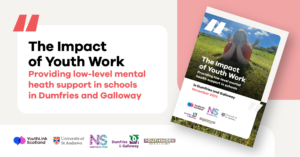A recent research study unveiled on 9th November highlights the positive impact of the Low-Level Mental Health Support Project in Dumfries and Galloway.

Young participants in the Low-Level Mental Health Support Project in Dumfries and Galloway have experienced significant benefits, including the development of well-being skills, increased confidence, improved self-esteem, and positive changes in attitudes towards school attendance.
Dumfries and Galloway Council’s Youth Work Service and Educational Psychology Service have embarked on a transformative project, introducing the Low-Level Mental Health Support Project to schools across the region.
In a significant development, YouthLink Scotland, Northern Star, and the esteemed University of St Andrews were commissioned in 2022 to conduct an external, independent evaluation of Dumfries and Galloway Council’s Youth Work Service and its implementation of the Low Level Mental Health Support Project in schools.
This evaluation seeks to address two pivotal questions:
“Dumfries and Galloway Council is committed to ensuring that young people get the right support at the right time. The Low Level Mental Health in Schools Project was successfully piloted over a two-year period across all 16 secondary schools in the region before expanding its offer and reach to young people from 2020 onwards. The initiative has worked with thousands of young people over the last five years and in 2022, YouthLink Scotland, Northern Star and University of St Andrews were commissioned to carry out an external, independent evaluation of the programme."
Chair of Dumfries and Galloway Council’s Education and Learning Committee, Richard Brodie
"To see a Scotland where all young people flourish, we first need to address why so many young people feel sad, lonely, and struggle with their mental wellbeing – and then seek new models of practice to support them. The Low Level Mental Health in Schools Project demonstrates the effectiveness and impact of combining a youth work and counselling skills approach through an effective partnership of the Youth Work Service, Educational Psychology and schools."
Tim Frew, Chief Executive of YouthLink Scotland
The findings of the year-long research study highlight the complex issues and challenges faced by young people, and deterioration of their wellbeing that led to the need for this project. Issues included difficulties at home or in relationships, caring responsibilities, substance abuse, low confidence and self-esteem, risk-taking behaviour, anger management issues, behaviour in school, bereavement, anxiety, stress, and low mood.
The evaluation documented in the study also found that the project gave young people the opportunity to learn how to open up and share feelings, develop self-awareness, and learn coping strategies and tools – and to feel listened to.
"This research demonstrates that by combining a youth work approach with counselling skills, schools can secure much improved outcomes for their young people – both educationally and in terms of wellbeing. Research on the impact of youth work can and does play an important role in shaping effective policy for Scotland's young people and cannot be ignored by decision makers."
Dr Amy Calder, Senior Policy & Research Officer, YouthLink Scotland
The study shows that the project has been able to successfully achieve these impacts on young people through two key features.
The research findings will provide professionals and their organisations key insights moving forward and reinforces the fundamental role that this project plays within our local communities – and the significant and life changing impacts it is having on our young people.